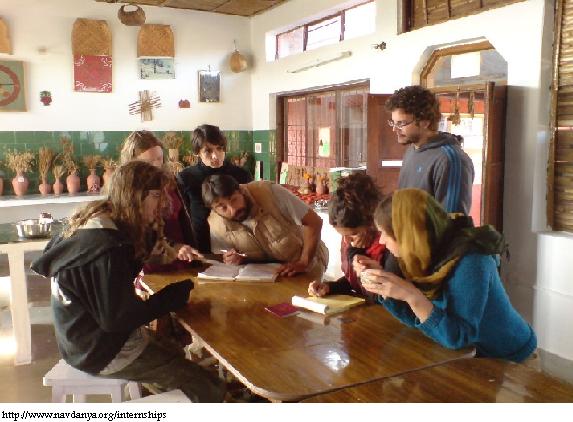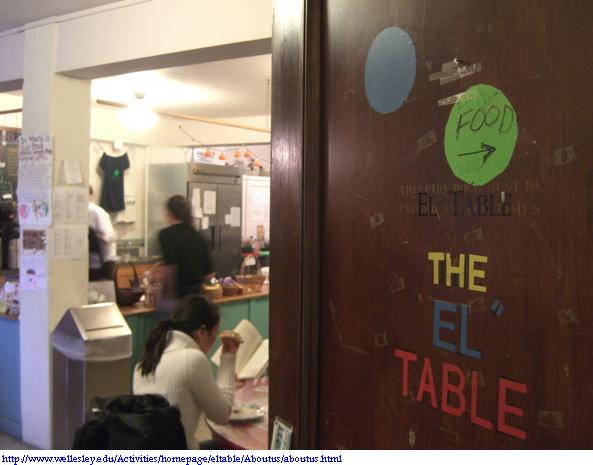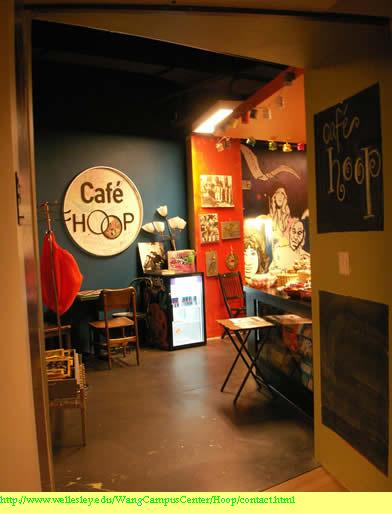The Solidarity Economy in India
home . SEWA . Action India . Navdanya . Get Involved!
Completing the Circle: Bringing it Back Home
In the previous examples, we saw how each of the different organizations contributes to understanding the "glocalizing" transformative processes and how they contribute to India's growing solidarity economy. An important feature of the Solidarity Economy is the integral role that the individual, the group, and the community play in promoting pluralism, social and economic democratization, and cooperation.
While our project is specifically about India’s growing solidarity economy, we would like to connect it to the global solidarity economy movement. We want to show that there are ways for students get involved in India’s solidarity economy by participating in the solidarity economy in the Boston area and beyond. Thus the power of "glocalizing". We will look at how Wellesley College students can get involved with these solidarity economies (for example through internships, on campus job opportunities and projects inspired by these groups); how our group project itself is contributing to the solidarity economy through spreading the word and creating global ties; and how the Wellesley College community as a whole is involved (i.e. the Wintersession trip to India and CWS programs).
One of the important aspects of the solidarity economy is the idea of locality and subsidiarity. Yet, it is also about thinking globally, which is why we chose this project. We are exploring the “solidaritistic” notion of thinking globally and acting locally. Our actions at Wellesley have important consequences and effects on our personal growth, on our campus, and to the organizations we choose to volunteer/work with through internships, wintersessions and other programs.
The solidarity economy exists in different forms: forms of working, forms of consumptions, forms of enterprise, forms of exchange and distribution, and forms of saving. (Matthaei) The form we are looking at is the solidarity economy form of working. The examples we will take range from being part of a worker-owned cooperative, working in a socially-responsible organization or a non-profit with solidaristic values, or serving as an unpaid worker (or volunteer) in a community organization or non-profit. (Matthaei) These forms will revolve around educational and student worker cooperative sectors.
WORKS CITED:
Julie Matthaei. Forms of Solidarity Economy, Examples for the class of Political Economy of Class, Gender and Race, March 29 2010.
Self-Employed Women’s Association, SEWA Career News. http://sewadelhi.org/volunteer.php (accessed May 2 2010)
Navdanya, Navdanya Internships, Navdanya. http://www.navdanya.org/internships (accessed May 2 2010)
Get Involved!
Available Wellesley-sponsored and Wellesley-located Solidarity Economy forms of Working:
- El Table: is a student worker cooperative, located in Founders Hall at Wellesley College. It is a café that serves sandwiches, salads, soup, snacks and flavored coffee.
Website: http://www.wellesley.edu/Activities/homepage/eltable/
To apply to work at El Table look out for application call-outs. Here is a doc file of the application form.
- Café Hoop: is a student worker cooperative located in the Wang Campus Center at Wellesley College. It serves snacks, sandwiches, and
Website: http://www.wellesley.edu/WangCampusCenter/Hoop/
To apply to work at Café Hoop, look out for application call-outs ! Applications are available then.
Wellesley College Identified Internships in India through the Center for Work and Service:
The internships are ten-week programs that usually take place in the following cities in India: Delhi, Mumbai and Varanasi. They involve working at the grassroots, and include educational, organizational and advocacy work. If selected the student is offered $ 5000 as a stipend ($1000 used for housing) The deadlines for these internships are usually around the first week of January. For more information and access to the application, please check out the website of Center For Work and Service at Wellesley.
Peace and Justice Studies, PEAC 324
Another program offered by the Peace and Justice Department at Wellesley College, which in itself belongs to the educational form of solidarity economy is the Grassroots Development, Conflict Resolution and the Ghandhian Legacy in India wintersession program. The wintersession course in India seeks to explore the challenges that India (and the world) is facing through hands-on experiences. This includes learning inside and outside the classroom setting by visiting NGOs, participating in seminars at local universities, and engaging in intercultural and interreligious conflict resolution at the Malaviya Center for Peace Research at Banaras Hindu University. For more information, please access the Peace and Justice website and the description of the program.
http://www.wellesley.edu/Peace/wintersession.html.
In addition to the preceding information regarding getting involved through set programs and opportunities at Wellesley College, there are other internships and volunteer opportunities at the organizations we talked about, SEWA and Navdanya. We will also list ways Wellesley College can support student’s travel and/or living expenses while volunteering or working.
Internship Opportunities at SEWA Delhi
Description: “SEWA Delhi encourages internship for candidates interested in working at the grassroots level. Internship at SEWA Delhi gives a chance to young scholars and activists to gain an exposure to the various issues and challenges faced by women informal workers and their families. Interns at SEWA Delhi can be a part of its various programs such as Organizing and Advocacy, Microfinance, Livelihood Promotion and Capacity Building.“ (www.sewadelhi.org)
Website: http://sewadelhi.org/volunteer.php
Internship Opportunities at Navdanya
Description: “Navdanya welcomes interns from across India and around the world to join the movement for ecological agriculture, food sovereignty, and living democracy. Interns garner skills and wisdom for building a sustainable future while sharing knowledge from their own communities and backgrounds. Navdanya’s work spans the gamut from grassroots organizing to international policy analysis. Interns thus gain exposure to many different levels of environmental advocacy––from making compost to preparing field reports to attending international conferences.” (www.navdanya.org)
Website: http://www.navdanya.org/internships
Other Internship Opportunities
- Sadhna: A Women's Handicraft Cooperative Enterprise located in Udaipur, India. They offer a stipend and housing opportunities for volunteers for 3 to 6 months.
Website:http://www.sadhna.org
- Seva Mandir: a non-governmental organization working for the development of the rural and tribal population in Udaipur, India
Website: http://www.sevamandir.org
- Foundation for Sustainable Development: A community development organizaiton
Website: http://www.fsdinternational.org
Traveling? You can still build solidarity and travel cheaply at the same time!
- World Wide Opportunities on Organic Farms (WWOOF)
Website: http://www.wwoof.org
Couch Surfing
- Website: http://www.couchsurfing.org/
Funding Opportunities
- Wellesey College’s Center For Work and Service (CWS) offers community service travel grants up to a $1000 and summer internship stipends ($3500, 5000) for suggested student internships domestically and internationally respectively.
Click here for more information:
- Another resource is from the Office of the Dean of the College at Wellesley College to carry student research for (250, 350, 360, or 370 course work) : (up to $750)
http://www.wellesley.edu/DeanCollege/studgrant/studappli.html



